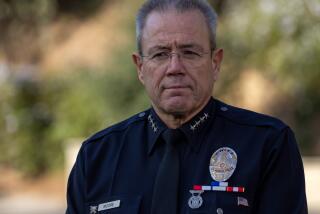In High-Crime Neighborhoods, the Line Cops Must Walk Is Fine Indeed
- Share via
Late one evening about a year ago, while I cruised with two deputies from the L.A. County Sheriff’s Department, we came upon a guy riding a bicycle in the Compton area.
The deputies, for reasons that were not apparent to me, decided to find out what he was up to, and we swooped in on him from behind.
As our car came to a head-
jerking stop, the deputy in the passenger seat drew his gun and aimed it at the cyclist through the windshield.
The next few moments, I knew, would be critical, and went to the very heart of what it means to be a cop in a tough neighborhood. Or to be a civilian.
There’s a tense moment in every contact on the street, but the drawn gun raised the stakes. My heart raced, and I remember the ripple in the tight forearm of the deputy who trained his weapon on this man none of us knew.
If the cyclist wheeled around with a weapon, I suppose the officers would have been justified in shooting him. But what if he was unarmed, and made an abrupt move out of anger or fear? He could be dead in an instant.
The cyclist turned out to be harmless. He was on his way to score some dope, he admitted. He had on a ball cap, and one of the deputies talked to him about baseball for a while, and then they let him go.
This surreal, potentially explosive relationship between police and civilians is played out every night in virtually every urban area. It is the story behind the story of the videotaped July 6 Inglewood police altercation with 16-year-old Donovan Jackson, which led to the indictment of two officers.
“That relationship is what causes Donovan Jackson cases,” says Jackson family spokeswoman Thandi Chimurenga. A police state exists in some neighborhoods, and getting pulled over is often seen as an act of harassment or hostility.
“We believe it’s simply to keep us terrorized,” Chimurenga said. “There’s no reason for six officers to pull over a car” for a suspected lapse in registration, as was the case with Donovan Jackson’s father.
She’s right about the overreaction, but it’s not as simple as that.
That night with the sheriff’s deputies, I asked why they stopped the cyclist at all, let alone pointed a gun at him. They said lots of gang members ride bikes so they can slip down alleys to avoid cops, and also to look less like gang members. It was the second time that night they had stopped someone on a bike.
When the deputies ran checks on license plates, they told me it was because a car of the same color was reported stolen. If they pulled over a motorist or stopped pedestrians to ask their name, where they were coming from and where they were going, it was because of recent drug activity in the area. Or it was because of an FBI report that a suspected bank robber might be in the neighborhood.
I didn’t buy into all these explanations. Cops are geniuses at establishing probable cause, and it’s easy to see why some folks resent being treated like suspects every time they leave the house.
But here’s the rub:
The crime rate is astronomically high in the neighborhoods we patrolled that night. Drug activity is out of control. Gang shootings are routine, and innocent people are sometimes caught in the cross-fire.
I obviously can’t know how the deputies I rode with might behave when a reporter isn’t around, and the fact that they pulled a gun on a cyclist in my presence is scary enough. But they talked about serving law-abiding residents who were fed up with crime in the neighborhood, and they believed they had the backing of those people.
Later, I checked in with several people in the community. Nobody wanted any unnecessary rough stuff, but almost to a person they said they wanted to see more of the police, not less. One woman told me about watching young thugs urinate on her flowers, and then being threatened when she complained.
I don’t offer any of this to excuse the thuggery we saw on the Inglewood videotape. Whatever led to the altercation, a cop who takes a handcuffed suspect, slams him into a car and then punches him in the face ought to be indicted.
No sympathy for that cop’s partner, either, who was charged with filing a false police report, apparently for failing to mention his colleague’s body slam.
But anyone who wants to scream about racism ought to first ask why the black leadership of Inglewood allowed a black police chief to put officers on the streets of a predominantly black city with less training than cops get elsewhere.
The job is explosive and confrontational enough without sending amateurs out there.
And if Rep. Maxine Waters wants to be a blowhard, that’s her business. But standing in front of cameras and waving a $10,000 check for the legal problems of the guy who videotaped this beating does not get to the heart of the matter.
Vast reaches of Greater L.A. lie in utter isolation and despair. Crime rates battle school dropout rates for national distinction. In Inglewood, a headless and armless body turned up in an alley July 11 and barely made the news.
No one should have a gun pointed at his head for riding a bicycle, and no cop should cold-cock a handcuffed suspect. But we’d do well to remind ourselves that, in the big picture, cops are neither the whole problem nor the whole solution.
*
Steve Lopez writes Sunday, Wednesday and Friday. Reach him at steve.lopez@latimes.com.
More to Read
Sign up for Essential California
The most important California stories and recommendations in your inbox every morning.
You may occasionally receive promotional content from the Los Angeles Times.














